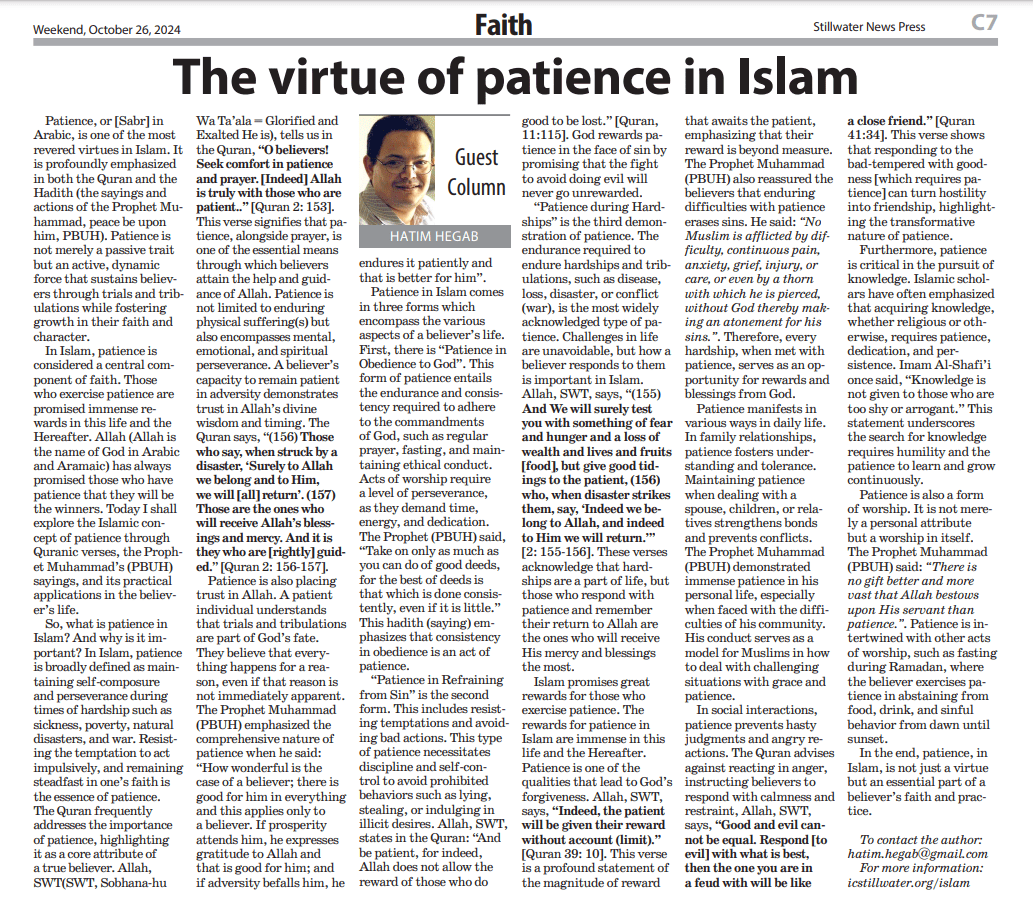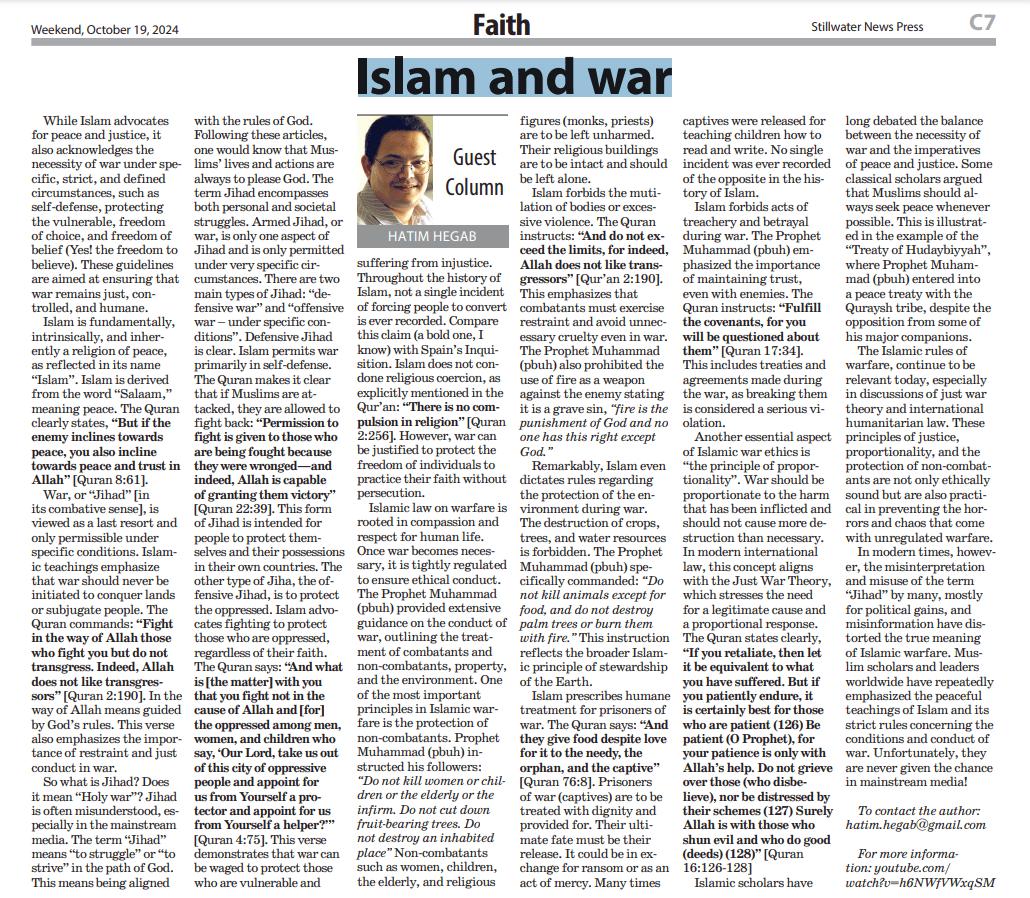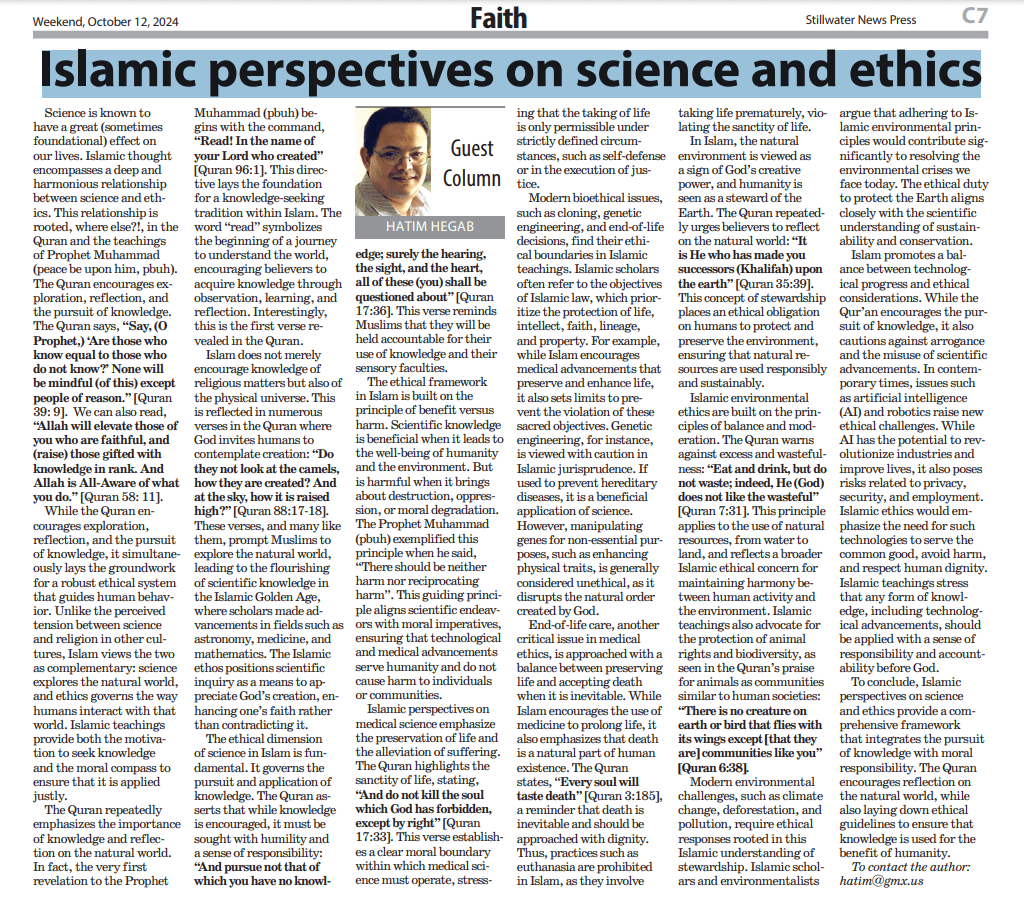10/26/2024 @ 10:29 pm
New Article Published
Dr. Hatim Hegab continues to contribute to the Faith page of the local newspaper, “The Stillwater News Press.” In his latest article, he talks about “The virtue of patience in Islam”:
Patience, or Sabr in Arabic, is one of the most esteemed virtues in Islam, deeply emphasized in both the Qur’an and the Hadith. It represents a steadfast commitment to faith and obedience, especially during hardship or adversity. Patience is seen not as passive endurance but as an active strength, helping believers remain calm and devoted to God’s will, regardless of their circumstances. In the Qur’an, God reassures the faithful, saying, “Indeed, Allah is with those who are patient” (Qur’an 2:153), highlighting the divine support extended to those who hold firm to patience. This virtue is central to developing a resilient and enduring character, as it fosters a deep reliance on God and detachment from worldly attachments and frustrations.
In addition to hardships, patience in Islam encompasses enduring the trials of self-discipline and resisting temptations. The Prophet Muhammad (peace be upon him) said, “No one is given a gift better and more comprehensive than patience” (Sahih Bukhari), underscoring its value as an all-encompassing attribute that enriches every aspect of a believer’s life. Patience leads to spiritual growth, humility, and greater empathy toward others. It is also a path to God’s forgiveness and a means of purifying the soul. Through patience, Muslims are encouraged to maintain hope, trust in God’s wisdom, and remain grateful, believing that every difficulty carries a divine purpose and ultimate reward.
10/19/2024 @ 5:49 pm
New Article Published
Dr. Hatim Hegab continues to contribute to the Faith page of the local newspaper, “The Stillwater News Press.” In his latest article, he discusses “Islam and war“.
Islam’s teachings on war are governed by strict ethical guidelines that emphasize **justice, restraint, and compassion**. Contrary to the popular misconception that Islam encourages violence, the religion outlines clear principles for engaging in armed conflict, known as *jihad*, which is often misunderstood. The Qur’an explicitly prohibits aggression, stating: *”Fight in the way of Allah those who fight you, but do not transgress. Indeed, Allah does not like transgressors”* (Qur’an 2:190). This verse highlights the defensive nature of permissible warfare in Islam, where fighting is only allowed as a last resort and in self-defense. War in Islam must adhere to principles of justice, ensuring that non-combatants, women, children, and the environment are protected from harm. The goal is not conquest or oppression but to restore peace and justice when other peaceful methods fail.
Additionally, Islam strongly advocates for seeking peace wherever possible, even in times of conflict. The Qur’an encourages reconciliation, stating: *”And if they incline to peace, then incline to it [also] and rely upon Allah”* (Qur’an 8:61). This reflects the Islamic emphasis on resolving disputes through dialogue and negotiation, rather than violence. Prophet Muhammad (peace be upon him) was known for his preference for peaceful solutions and only engaged in defensive wars when all other options had been exhausted. Islamic ethics regarding war also forbid excessive violence, destruction, and harm to civilians, underscoring the importance of moral conduct even during conflict. Thus, Islam’s perspective on war is one that prioritizes justice, defense, and the ultimate goal of peace.
For now, Dr. Hegab’s articles on political issues are not included in this list of his articles.
10/12/2024 @ 5:39 pm
New Article Published
Dr. Hatim Hegab continues to contribute to the Faith page of the local newspaper, “The Stillwater News Press.” In his latest article, he talks about “Islamic perspectives on science and ethics”:
Islamic perspectives on science ethics are deeply rooted in the principles of **balance, responsibility, and moral integrity**. Islam encourages the pursuit of knowledge and scientific inquiry, considering it an act of worship when done with the right intentions. The Qur’an contains numerous verses urging Muslims to reflect on the natural world and seek knowledge, as in: *“Say, Are those who know equal to those who do not know?”* (Qur’an 39:9). However, scientific pursuits in Islam must be conducted with an ethical framework that respects human dignity, the sanctity of life, and the environment. Islam emphasizes that knowledge should be used for the benefit of humanity and not for harmful purposes, reinforcing that with great knowledge comes great responsibility.
In the realm of bioethics and technology, Islamic teachings underscore the importance of **intentions and consequences**. For instance, while medical advancements are welcomed, they must be aligned with principles like the sanctity of life (*hurmah al-hayat*) and not violate natural laws or Islamic guidelines. Interventions like cloning, genetic modification, or life-extension technologies are subject to ethical scrutiny in Islamic jurisprudence. The Prophet Muhammad (peace be upon him) emphasized balance in all matters, which extends to science and technology, ensuring that progress does not compromise morality. In this light, the pursuit of scientific knowledge is seen as a tool to enhance human well-being, as long as it adheres to ethical boundaries established by divine teachings.
For now, Dr. Hegab’s articles on political issues are not included in this list of his articles.
10/05/2024 @ 5:39 pm
New Article Published
Dr. Hatim Hegab continues to contribute to the Faith page of the local newspaper, “The Stillwater News Press.” In his latest article, he discusses “Accountability of Islam“.
Accountability in Islam is a fundamental principle that emphasizes personal responsibility for one’s actions. Muslims believe that every individual is accountable to Allah for their deeds, whether good or bad. The Qur’an and Hadith frequently stress that nothing escapes Allah’s knowledge, and every soul will be judged accordingly on the Day of Judgment. As Allah says in the Qur’an: “And fear the Day when you will be returned to Allah. Then every soul will be compensated for what it earned, and they will not be wronged” (Qur’an 2:281). This verse highlights the Islamic teaching that each person will be held accountable for their actions and will be judged with perfect fairness. The concept of accountability encourages Muslims to live with integrity, constantly reflecting on their behavior to ensure that it aligns with Islamic values.
In addition to individual responsibility, Islam promotes the idea of communal accountability. Muslims are encouraged to promote good and forbid evil, ensuring that society as a whole adheres to ethical and moral principles. The Prophet Muhammad (peace be upon him) said: “All of you are shepherds, and each of you is responsible for his flock.” This Hadith emphasizes the importance of looking after others and holding ourselves accountable not only for our own actions but also for the well-being of those around us. The principles of justice, fairness, and mutual responsibility are deeply ingrained in Islamic teachings, creating a comprehensive system of moral accountability that applies both to individuals and to the community at large.
For now, Dr. Hegab’s articles on political issues are not included in this list of his articles.



